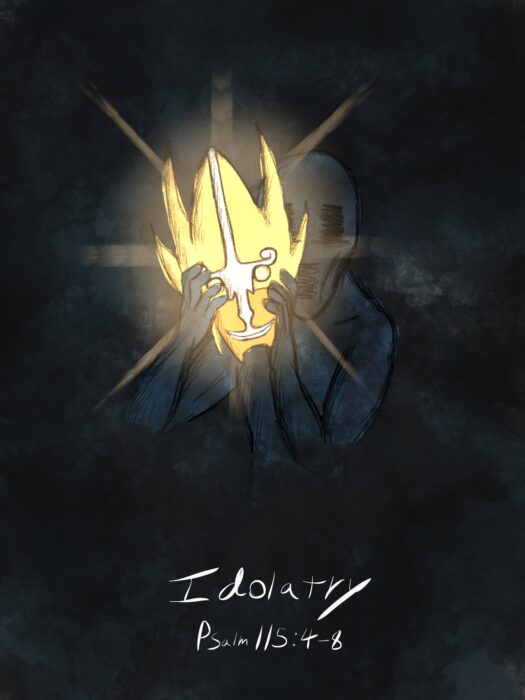
John 13:8, “If I do not wash you, you have no share with me.”
What does Jesus mean by this? What is it about receiving His service of foot washing that proves one either to be “in” or “out” of Christ? The Lord’s words here point us to a deeper meaning bound up in the image of the foot washing….there is something about this lowly act of the Servant performed by the exalted Lord which to receive proves one to be His own, and to reject proves one to be cut off.
Lord of Glory, Suffering Servant
Now, even as I typed that, I was reminded that just a few verses earlier in John 12:38-41, John unites the imagery of the Exalted Lord (Isaiah 6) and the Suffering Servant (Isaiah 52-53) and applies them both to Jesus. It seems significant, then, that here in chapter 13 we would see Jesus, “knowing that the Father had given all things into His hands, and that He had come from God and was going back to God…” (in other words, knowing Himself to be the Isaiah-six-Lord-of-Glory), it seems significant that we see Jesus, precisely because He is conscious of these realities, rise from the seat of honor, clothe Himself as a Servant, and descend to the lowest place of ministry, washing His disciples’ feet. This act foot washing—combined with John’s presentation of Christ’s thoughts and motivations—brings together the Isaiah 6 Lord and the Isaiah 52/53 Servant in one person, namely, Jesus Christ.
And, for the same reasons, this scene also pictures the incarnation, especially echoing the “Christ Hymn” of Philippians 2:6-11 (and most especially 6-9). In Philippians 2 we see that because of His glory, because of His equality with God, because He is the exalted Lord therefore He rises from the seat of honor and descends as a servant. That is the incarnation; and that is also the foot washing. In both instances its critical to see that the act of service, the act of lowliness, the act of getting down and lifting up is grounded in and the fitting fruit of the Son’s exalted glory.
If I Do Not Wash You, You Have No Share In Me…?
But now, back to the original question, what is it about this foot washing that makes it necessary for Christ’s disciples to receive. Peter would have “no share” with Christ unless he had allowed Him to wash his feet….why? I think the two previous paragraphs give the beginnings of an answer. This act of service is not simply something that Jesus decides to do, it is an instance, an expression, a manifestation of the very heart of God. To receive the One True God is to receive Him as the One who alone can save and heal and cleanse and carry, and to receive Him as the One who gives Himself wholly to achieve this end in the lives of His people. He is the God who “empties” Himself, who gives Himself, who pours Himself out and who—in doing so—manifests the glory of His Name, for which the universe exists. Jesus’ service of foot washing is a manifestation of the character of God, and to reject it would be tantamount to rejecting God Himself……Peter could have no share in Christ unless he allowed Christ to wash his feet because there is no God in Christ to receive apart from the God who becomes the servant of His people that they might be raised to Him.
But what of the words that follow? Peter, hearing Jesus’ ultimatum, reverses his plea and asks for his hands and head too to be washed. But to this, Jesus replies that Peter is “completely clean” and needs only to have his feet washed. Now, again, Jesus is not talking about physical cleanliness etc. here. His point is that Peter—and the 10 other true disciples—are “already clean,” in heart/spirit because of the word that He has spoken to them (15:3), namely, the word about who He is as the Son of God sent from the Father. They have received the word about Jesus, they have received Him as the Son of God and Savior of the world, as the One sent by the Father and whom to see is to see the Father……they have accepted this word and so they are “already clean,” but—with this word in mind, with Christ’s identity as the Lord who perfectly reveals the glory of God firmly before them—they must now receive one thing more, namely, the fact that this Lord descends to the lowest place as the suffering servant.
Knowing the Lord of Glory as the Suffering Servant
If they know Him only as the Lord, only as the Son of God, only as the Revealer of the Father who reigns in power…..they have no share in Him……they must know Him as all these things, and, knowing Him thus, see Him descend to the depths, see Him poured out as a servant, see Him stripped and lifted up as the curse bearing sacrifice on the tree, see Him pierced with a Roman spear and buried in a tomb of stone. That is the key here. Until we know the Lord of Glory who possesses all authority as the Suffering Servant who washes our feet (and more, who bears our sins and receives our death and swallows our hell), indeed, until we see the glory of the Lord in the Suffering Servant—we have no share in Christ.
In light of these things, the washing of the feet is a foreshadowing, a pre-embodiment of the glory that is to be revealed at the cross (13:31-32, 17:1-5). If Peter could not bear this image, how could he possibly bear the reality? If he could not receive the foot washing ministry of his Lord, how could he receive the soul-washing ministry? If he could not stand to see the one he knew as his Lord bowing to clean his feet….how could he stand to see this same Lord of glory stripped and nailed to the tree? And yet, he is enabled to receive the foot-washing and is similarly enabled to receive the soul-washing.
So, Jesus’ washing of His disciples’ feet is the final foreshadowing of the cross (as well as an instance of the same character that motivated the incarnation), it is an embodiment of all that will be manifest with greater horror and splendor on Calvary. And yet, the dynamic is the same. The Lord of Glory—because He is the Lord of glory—descends to serve. Unless we see our God in this…..unless we know our God in the Foot-Washing Servant and—definitively—in the Crucified Jesus, we have no share in Him


